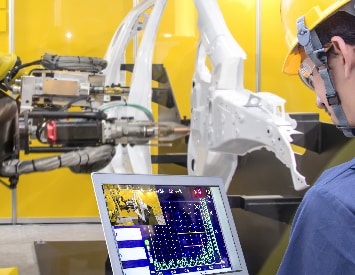Dear Colleagues
Through my observation of engineers and technicians over the past 30 years I have discovered that certain traits or habits make them successful – very successful, in some cases. I believe that we can all become extraordinarily able through the adoption of these practices. Thanks to Buckbee and Covey for the inspiration to write this.
1. Know your Process, Operator and Client/Customer
Firstly, before you can commence engineering a project you need to have an in-depth understanding of all aspects and angles of the project that you are working with. If it is designing a better control and instrumentation system you need to understand the process intimately. If it is for the electric distribution system for an arc furnace; you had better understand the characteristics of the metal you are arcing and the resultant harmonics.
Secondly, naturally you have a client with a set of requirements to be considered and facilitated. For example, she may want you to build a wind turbine for renewable energy, but is also concerned about the plight of a particular breed of bird in the locality, on the verge of extinction, which may be hurt in the turbine blades.
Finally, if you’re designing a wonderful engineering system you will probably require an operator to use it. You need to understand what his needs are. The operator generally knows far more about how the process behaves (esp. at 2am) normally, abnormally and during failures. Sometimes the operator and the client are the same – for example, Steve Jobs when designing the iPod had to consider an unpredictable teenager (client and operator) making peculiar demands on the hardware
This all takes an enormous amount of effort and time. But there are no short cuts here. Failure to adequately understand the process, operator and customer is effectively the same as building a house of straw (rather than with mortar and bricks); We all know what happened to the little pigs when the big bad wolf came calling.
2. Be Proactive with your Engineering
Unless you drive the engineering project and your team the project will never reach completion. It is essential to be constantly on the lookout for problems and their solutions. It always amazes me that even the tiniest issues can hold up an entire multi million dollar project – a screw or chip missing, or an unsecured wire.
Always apply the maxim – “when there is any doubt; there is no doubt” – when engineering something. If you suspect the HVAC design hasn’t taken into account the amount of dust in the air or the PLCs have a memory sizing problem, then check check check. You will no doubt find that your worst suspicions are correct. An apt quote from Andy Grove of Intel (the almost chemical engineering founder): “Only the paranoid survive in engineering”. (He actually referred to business in the original quote).
Being proactive means that you need to be committed and have a passion for what you are doing in engineering. (Our lives are too short to waste doing things we don’t want to do). So show your passion and take everyone along with you. Be precise and meticulous at all times and demand this from everyone on your team. A slight miscalculation or delay in ordering a critical item can be a disaster for a project.
3. Prioritize at all Times
As Covey says: “The main thing is to keep the main thing the main thing”. You will be inundated on a daily basis with fighting fires, including equipment failures, meetings and people demanding your time. Constantly clarify what the most important issues are and focus on them (filter out all other distractions). For example, Buckbee suggests that in a process manufacturing environment, the main things are probably:
- Unit Cost
- Production rate
- Quality
- Energy costs
- Reliability
- Environmental and safety
Note how (and engineers hate this) the emphasis is on $$$; not direct technical things to prioritize.
4. Document the beginning
Define the beginning of the project in business terms (i.e. $). You can certainly link in technical metrics, but the overriding aim has to be on improving a particular business metric with the proposed project. Ensure that everyone is in agreement with what you currently have in front of you and what you will be doing to improve this.
5. Communicate well and extensively
This is an area most engineers don’t like to get too involved with. Reading, writing and speaking in simple understandable language is not a preferred activity for most engineering professionals. But you have to communicate your requirements and successes in simple business terms. Long reports detailing exquisite technical accomplishments are never read. A short email with a provocative subject line: “$340,000 savings with flowmeter installation” followed by before and after pictures and some examples of how you have improved the quality (lower variability) of the process is far more powerful than a detailed 200 page account which includes the problems with the flow loop and the challenges in installation.
6.Use your Tools Effectively
As engineering professionals we all like to dig deeply and to investigate the technical issues; and we sometimes get sidetracked from the main game with these activities. Instead we need to use effective tools to get our results as quickly as possible without being sidetracked into minor issues.
And always ensure your tools are doing the right job. Compare their results with what you would intuitively expect – based on your past experience. Never trust a software program until it has proven itself in all circumstances.
7. Keep Sharpening your Skills and Know-how
Technology changes on a daily basis. You need to keep sharpening your skills by reading widely; exchanging views with your technical peers; attending outstanding training courses (which will be clearly beneficial) and drawing on your mentors to assist you with challenges. Keep a natural curiosity in everything you do. Keep questioning the ways you and your colleagues do things and examine ways to improve on these. Never accept a particular method of doing something without testing its assumptions. And never trust anecdotal information that something is superior. Always examine information gleaned from the web and magazines with a critical eye – look for the flaws – question everything. And remember that on-the-job training is probably the most powerful training you will ever receive.
Form these 7 habits and you will become a significant source of expertise. Encourage your peers to do the same. Sharing your know-how with others is one of the great traditions of the engineering profession.
Thanks to George Buckbee of Expertune and Stephen Covey for the inspiration and reference material to write this article.
Yours in engineering learning
Steve


